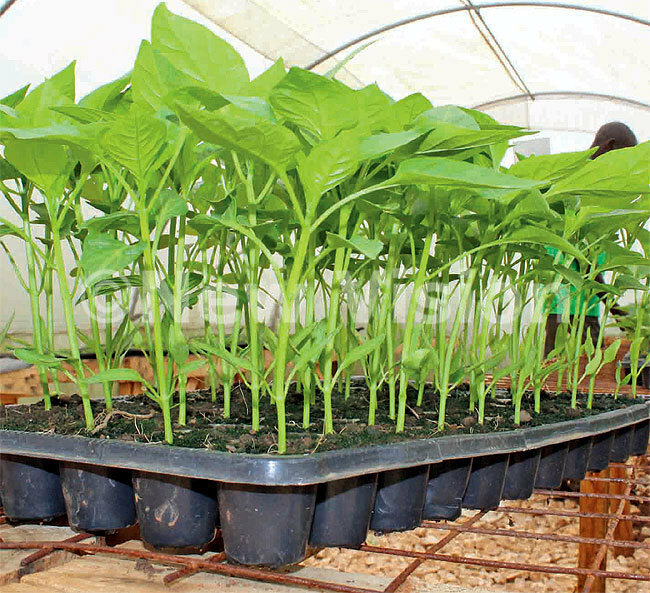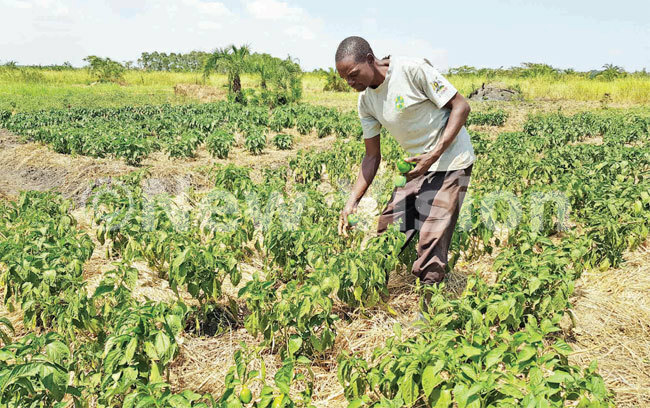Luwero farmers reap big from healthy seedlings
Jun 29, 2018
“We were trained on how to raise healthy seedlings which are free of pests and diseases."

PIC: Farmers from Zirobwe checking seedlings in a screen house
AGRICULTURE | BUSINESS
Kamu Kalanzi is a vegetable farmer in Zirobwe, Luwero district. He has been growing green pepper for over six years.
From the time he started growing vegetables, Kalanzi has always raised his own seedlings, which he grows in a nursery bed before transplanting them to the garden.
For the first two years, however, the yields were not impressive despite Kalanzi's efforts. His vegetables often suffered attacks from pests and diseases. He almost gave up on farming as a result.
However, 2016 marked a turning point for Kalanzi and other farmers who were trained by Volunteers Effort for Development Concern (VEDCO) on the use of healthy seedlings.
VEDCO is implementing the Health Seedlings for Safe and more Productive Vegetables in East Africa project in Luwero, Mukono and Mityana districts. The project was funded by Austrian Development Agency (ADA).
"We were trained on how to raise healthy seedlings which are free of pests and diseases and since then, we have been able to see our productivity increase," Kalanzi says. Through the healthy seedlings project, farmers were provided with screen houses where seedlings are raised before being transplanted.
"The seedlings grow fast and are strong compared to the ones we used to grow in our nursery beds. They even do not require a lot of watering when transplanted," Kalanzi says.

Green pepper seedlings in a screen house
Ivan Sekanjako, a researcher with International Institute of Tropical Agriculture (IITA), says the screen house is an effective tool to minimise pests from damaging crops, which may result in reduced productivity and crop failure.
"The screen houses were given to farmers in groups so that they can develop their seedlings and plant healthy seedlings for better production," Sekanjako says.
Over the last three years, farmers have been trained on the benefits of raising healthy seedlings.
VEDCO established demonstration also on farmer fields. "Through the fields, we were able to see the difference between healthy grown seedlings and the ones they were growing. We expect to see them maintaining the screen houses and raise seedlings they can even sell to other farmers," Sekanjako says.
The use of a screen house also helps minimise on the usage of pesticides thus saving farmers' incomes.
Each nursery has a capacity to produce over 20,000 seedlings at a given time. Community nursery hosts have received the training.
To demonstrate the benefits of using healthy seedlings to farmers, a total of over 75 farmers have been engaged in on-farm trials aimed at demonstrating to farmers the benefits of establishing a vegetable field using healthy seedlings.
About 1,000 farmers have been trained over the last three years.

Zirobwe farmer David Ochude says seedlings have helped them save money on pesticides
David Ochude, another farmer from Zirobwe says he no longer uses a lot of pesticides.
"These seedlings have helped us save money on pesticides. They leave the screen house when strong and rarely get attacked by pests," Ochude says.
He says his productivity has increased and he now produces up to 11.6 tonnes of tomatoes per acre up from seven tonnes when he used to raise his own seedlings.
According to Julius Ssemambo the monitoring and evaluation officer at VEDCO, the project is led by IITA in collaboration with other partners like Real IPMUganda, Makerere University- Uganda, Graz University of Technology and University of Addis Ababa,Ethiopia.
The project is geographically focused on ADA focal countries of Uganda and Ethiopia, where prevalent plant health problems persist in the intensive peri-urban vegetable gardens.
"The aim was to overcome pests, diseases and increase vegetable production by resource poor farmers in periurban areas of East Africa," Ssemambo says.
He notes that this has been achieved through reducing over dependence, abuse and or misuse of synthetic pesticides and promotion of environmentally friendly biopesticides in managing and controlling vegetable pests and diseases.
Ssemambo says the nurseries will not only make it possible for other farmers within the communities where the nurseries exist to easily access healthy seedlings, but also the small margins got from the nursery business will also be used to improve individual farmer incomes and the farming associations to which the farmers belong.
